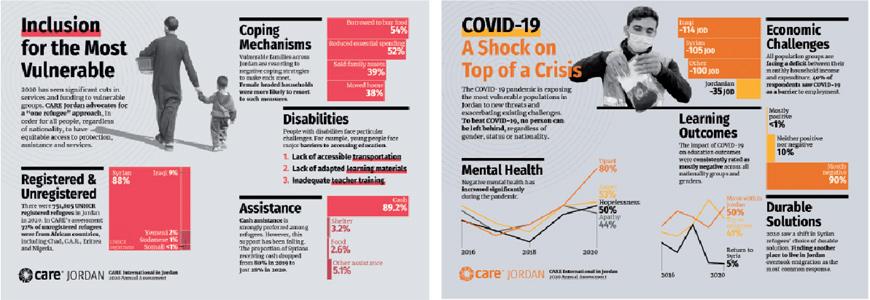- Local News
- Tue-2021-01-26 | 07:07 pm

Nayrouz News Agency : The COVID-19 pandemic has had a profound impact on Jordan’s most vulnerable population during 2020 and has exposed them to new challenges, according to a recent report by a global relief agency.
During a virtual ceremony on Monday, CARE Jordan launched its 2020 annual assessment, which is carried annually to support humanitarian and development actors and other key stakeholders in building a better response that addresses the needs of the most vulnerable populations in Jordan.
Titled, "10 Years into Exile: A Shock on Top of a Crisis”, the assessment is the ninth in a research series which CARE Jordan uses to analyse and track the needs, vulnerabilities and coping mechanisms of refugees and host communities in Jordan.
The five key themes that structure the 2020 annual assessment are social protection, sustainable livelihoods, gender equality, education and durable solutions.
"The COVID-19 pandemic forced countries around the world into a difficult fight against the virus and its repercussions, with policies to limit the transmission of the virus being introduced. The effect of COVID-19 on refugees and vulnerable host communities was examined as a cross-cutting theme,” the report said.
Four groups have been targeted by the assessment: Jordanians, Syrian refugees, Iraqi refugees and refugees of "other” nationalities.
Citing UNHCR figures, CARE Jordan said that 88 per cent of registered refugees in Jordan are Syrian, 9 per cent are Iraqi, and the remaining 3 per cent belong to other nationalities (including Yemeni, Somali and Sudanese refugees).
"The COVID-19 pandemic is compounding protection concerns and exposing vulnerable populations to new threats: An increase in violence, including what has been described as a "shadow pandemic” of gender-based violence (GBV), and challenges in access to health, food, water, education and legal services for vulnerable and marginalised groups and deterioration in mental health,” the assessment said.
According to the assessment, the coronavirus pandemic has also led to a decrease in livelihood opportunities for vulnerable segments signalling an alarming protection concern with average household incomes decreasing compared with increasing monthly expenditures.
The report said that some of the most vulnerable communities, including in Jordan, are now forced to resort to adverse survival strategies with limited safe alternatives as a result of the economic shock brought on by the COVID-19 pandemic.
Social protection
In the absence of specific legislation addressing the status of refugees and asylum seekers in Jordan, rates of registration with UNHCR and the entitled rights vary by nationality, the annual survey said.
"While the government of Jordan estimates that 1.36 million Syrians have sought asylum in Jordan since 2011, not all of them are registered with UNHCR. Of the approximately 752,000 persons of concern (PoC) registered with UNHCR in Jordan, approximately 662,000 are Syrians (88.1 per cent) with the remaining 90,000 come from 57 nationalities, including Iraq (8.9 per cent), Yemen (1.9 per cent), Sudan (0.8 per cent), Somalia (0.1 per cent), and others (0.2 per cent),” the survey said.
According to the survey, Syrians are more likely to be registered with UNHCR than minority refugee nationalities.
"Most (98.1 per cent) Syrian refugees in urban areas report being registered, in contrast to 28.4 per cent of refugees from Chad, Central African Republic, and Eritrea. Registration levels of Somali, Sudanese, Iraqi, and Yemeni refugees are even lower — between 1.9 per cent and 8.3 per cent. There is also a small gender-related registration inequality. Females in respondent households are more likely (5.4 per cent) to report being unregistered in comparison with 4.5 per cent of males,” the report said.
"The lack of a unified approach addressing the status and rights of refugees regardless of nationality means that non-Syrian refugees face specific challenges when attempting to access assistance. Funding tends to target the Syrian refugee population, and key informants for this assessment reported that refugees of other nationalities are sometimes turned away from programmes funded to assist Syrian refugees. Non-Syrian refugee participants in FGDs corroborated this finding,” the report said.









